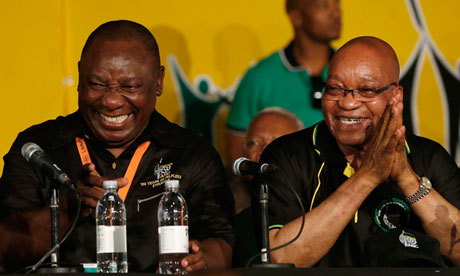Despite its parliamentary majority, 2014 was a year of reckoning for the ANC. Seemingly no longer in command of Parliament or public opinion, it emerged from the election bruised but not defeated. However, its performance lacks the swaggering bravado we have come to expect – it knows it has been wounded. Whether it can staunch the support it is currently bleeding, and prevent it from becoming fatal, remains to be seen. It is clear, that as the party limps towards the 2016 local elections, and beyond, it faces a serious crisis of leadership.
Jacob Zuma’s headship of the post-apartheid ANC is not unique. His practice of patronage politics, purges, and paranoia is no different to the leaders he succeeded. Indeed, having been a beneficiary, and victim, of Thabo Mbeki’s time in office, it should come as no surprise.
Even though the rot is particularised to him that is not the case. It is a forgivable mistake: (1) Now that the media has (finally) cottoned on, they are better at exposing it (Zuma just happens to be the person in charge when they are best placed to write about it); and, (2) the DA, with its “Stop Zuma” campaign, successfully managed to bind Zuma personally to the decay that his politics allows to fester.
But, this remains a systemic issue. The ANC is a pseudo federation that allows individuals to build enclaves in which they concentrate political power within themselves. In turn aspirant leaders have to build alliances – often between warring factions – to ensure their own success. Following, and intervening, in every one of your allies’ battles is not so much a choice but a necessity – their success has a causal effect on yours. For this purpose, political support, power and money – via state contracts, positions, and access – are all readily traded. It is all-consuming.
Yet, Zuma’s ANC – to borrow a phrase – seems to suffer this more acutely.
While at the helm, Mbeki, the benevolent overlord, made the state serve the party. In exchange, the party was to keep him in power so they could all benefit. When he started favouring some to the detriment of all, he was booted out. But, in normalising this modus operandi, he allowed Zuma’s ANC to go one step further: the state would be subjected to the ANC, which would be subjected to him. And unlike Mbeki, his control would be absolute.
Compare and contrast — during Mbeki’s tenure — the Arms Deal and “Petrogate” with Zuma’s Nkandla and “Guptagate”. While the amount of money involved may be significantly less, the identity of the beneficiaries is instructive: now, even the ANC serves Zuma Inc.
While Zuma’s motivation for power might be personal, there is no real guarantee that his successor won’t do similar – or worse.
Since his deputy, Cyril Ramaphosa, has taken a more central role many suggest that he is preferred, better, option. That would be mistaken. Though Ramaphosa has his billions, and does not need the state to enrich himself, he still has to engage in the same gutter politics in order to succeed within the ANC. And therein lies the bottom: the race to the bottom will occur that much quicker as factions learn from election to election and seek to extract as many benefits as they can.
Further, Zuma’s masterstroke has been to co-opt Ramaphosa into his operation. In accepting the poisoned chalice, Ramaphosa has denied himself the one thing that may have saved him if he succeeds Zuma: plausible deniability. Upon taking office, Ramaphosa could have hung Zuma out to dry in order to create clear blue water between them. Such a move would have flat-footed the opposition, silenced civil society, and shown that he was serious about governing. That option is no longer available. Zuma never sought to go after Mbeki once he had succeeded him because he was, for a long time, an important figure in Mbeki’s war. Ramaphosa is now the same. Like Zuma, he may reject everything his predecessor stood for but he will be bound to him out of self-preservation if anything else.
As its leadership problem deepens internally, the external manifestations will only become worse. Already, the ANC’s legacy of achievement – that any party would have rightfully claimed after 1994 – is sullied by the stench of corruption, power abuse, and undermining the Constitution. This, it seems, will become its legacy. How much worse things will get before they become better is unknown. But one hopes that things will change quickly. As Yeats warned, “things fall apart; (when) the centre cannot hold”.
This article was first published on The News Hub.



